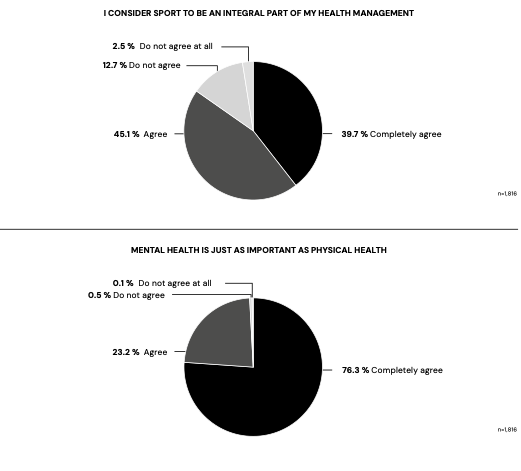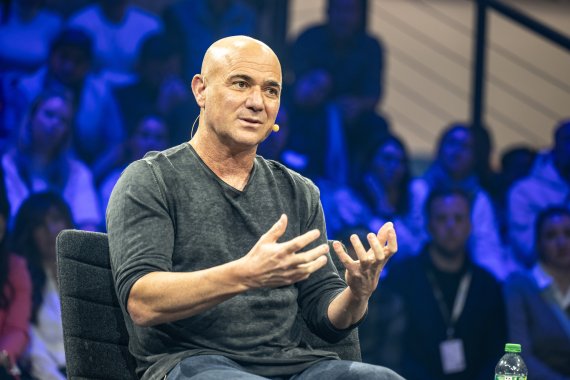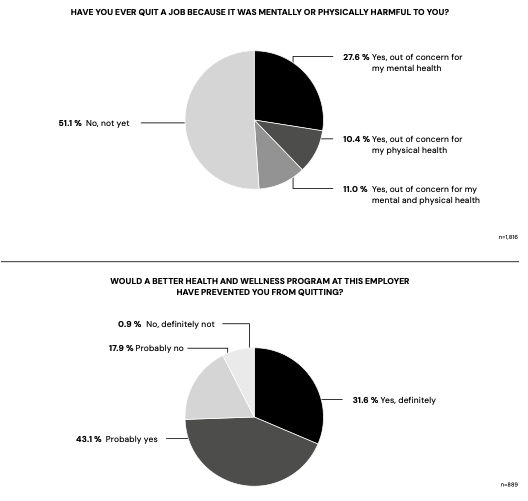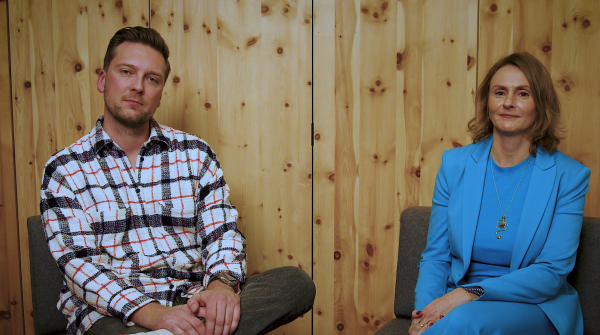ISPO believes that mental health must play a central role in the private and professional environment not just one month a year, but every day. That's why the topic will not only be covered this month as a special on ISPO.com, where we will highlight aspects of mental health such as women's health or corporate health on a weekly basis. This important future topic will also be given space at ISPO 2025: For the first time, there will be a separate hall area within Arena Brands & Products dedicated entirely to the growing Health & Wellbeing segment. ISPO is thus recognizing the great added value that sport can provide for physical and mental health and creating a platform for greater visibility of innovations and ideas in this area.
Exercise not only has a positive effect on the body, but also helps to reduce stress, alleviate anxiety and reduce depressive symptoms by up to 30% - a clear indication of the mental power of sport.
The ISPO whitepaper "Sport, Health & Retail: 9 game-changing mindshifts for the future" highlights the close link between physical activity and mental health: more than 60% of respondents said that their motivation to exercise is strongly linked to their mental well-being. This finding underlines the fact that sport is not only important for physical health, but also plays a crucial role in mental strength.
Jana Kesenheimer, ultracycling athlete, also gives an insight into the mental side of extreme stress in the ISPO exclusive interview and explains how resilience can arise from it. But the effect doesn't always have to be big: just 1,000 steps a day can reduce the risk of depression by 9%.
One thing is clear: the demands on the industry are growing. The majority of respondents expect brands to become more actively involved in mental health. Specific offers are in demand - from recovery zones and mental health workshops to partnerships with health organizations. Sponsoring initiatives or own awareness campaigns also offer potential to initiate real change

Mental health affects us all, but is often overlooked in everyday life - with far-reaching consequences. Studies by the University of Queensland and Harvard Medical School show that one in two people worldwide will experience mental health problems in their lifetime. These figures illustrate how central mental well-being is to quality of life.
The need for action is clear: if mental health is neglected, this has far-reaching consequences - not only for the person affected, but also for their environment, performance and social interaction. Initial signs such as sleep problems, irritability or withdrawal should not simply be ignored. They are often the first warning signs that it is time to take a closer look.
As Malaika Mihambo, Olympic and world champion in the long jump, emphasized in her talk at ISPO Munich, it is precisely your own limits that need to be respected in order to stay healthy in the long term:
You don't raise your level by always going beyond your limits.
But it is precisely these limits that are often ignored, which means that mental health is still not as important as physical health.

I struggled for many years with problems in the early stages of my career. [...] So it's perfectly okay to be vulnerable. [...] Vulnerability is important for personal growth.
With these words, ex-professional tennis player and speaker at ISPO 2024, Andre Agassi sums up what is long overdue: Mental health must get out of the taboo zone.
Because: Mental challenges are not a weakness - and certainly no reason to be ashamed. Everyone struggles. Some visibly, many in secret. Only when we talk about it can we create space for mutual support and real change.
Karin Wagner, expert for workplace health promotion at Mavie Work, also calls for a rethink in her talk at ISPO Munich on "Success through mental health":
We talk about training plans and skills - but hardly about mental strength.
Yet it is the basis for resilience, performance and healthy cooperation - in sport as well as in professional life.
Now is the time to make mental health visible. Open. Normalized. And a natural part of our everyday lives.

Almost one in two women in Germany classify their mental health as critical - the figure for men is significantly lower. Young women are particularly affected. According to the AXA Mental Health Report 2024, 40% of 18 to 34-year-olds suffer from mental illnesses such as depression, anxiety disorders or eating disorders.
However, although 70% of those affected are well informed about help services, almost a quarter do not make use of them. The reasons? High everyday stress levels, lack of time, too few low-threshold services.
These figures are a clear call to action: prevention must become more targeted, help more accessible - and mental health must be made more visible, destigmatized and actively promoted, especially for women.
Mental stress in the workplace is a serious issue worldwide. According to the World Health Organization (WHO), around 12 billion working days are lost each year due to depression and anxiety disorders - equivalent to around $1 trillion in lost productivity worldwide. In the United States, 76% of employees report experiencing at least one symptom of a mental health condition, and 84% state in Mind Share Partners' Mental Health at Work Report that their working conditions have contributed to at least one mental health challenge.
Despite these alarming figures, many employees feel alone in their day-to-day work with their mental stress. A survey by Lyra Health found that 86% of respondents had experienced at least one mental health challenge in the past year, but only 33% had sought professional help.
For Karin Wagner, this is a wake-up call. Companies have a duty to take targeted action - and managers play a key role in this. They are often the first to recognize psychological stress and should be actively involved in prevention, education and early detection.
An open corporate culture in which mental challenges can be discussed helps to reduce stigmatization. Corporate health is not a "nice to have" - it is a key prerequisite for satisfaction, motivation and long-term loyalty. What is needed now are bold programs that promote mental strength as much as physical health.

Each and every one of us can do something for our own mental health. Even small changes in everyday life - such as regular breaks, fixed bedtimes and exercise - can make a big difference. It's about keeping body and mind in balance and paying attention to your mood.
"It feels empty to win without living life to the fullest," says Malaika Mihambo. "That's why I would always prefer losing if it means being happy."
It's not just about physical success, but about balancing physical and mental health in order to be truly happy. Mental health starts small, but its impact goes a long way.
Mental Health Awareness Month shows: The topic of mental health is becoming increasingly important to society - but real change needs more than words. Openness, visibility and understanding must become part of everyday life.
Health & Wellbeing is the fastest-growing area of the sports industry - and is therefore present for the first time with its own dedicated area at ISPO 2025. The focus: regeneration, sport, prevention and mental strength. This is where new networks, collaborations and concrete solutions for the future of sport and health are created.
Be there - from 30. NOV. - 02. DEZ. in Munich.
 Sports BusinessValues in the sports business - strategies for more authenticity
Sports BusinessValues in the sports business - strategies for more authenticity
- Awards
- Mountain sports
- Bike
- Fitness
- Health
- ISPO Munich
- Running
- Brands
- Sustainability
- Olympia
- OutDoor
- Promotion
- Sports Business
- Textrends
- Triathlon
- Water sports
- Winter sports
- eSports
- SportsTech
- OutDoor by ISPO
- Heroes
- Transformation
- Sport Fashion
- Urban Culture
- Challenges of a CEO
- Trade fairs
- Sports
- Find the Balance
- Product reviews
- Newsletter Exclusive Area
- Magazine




